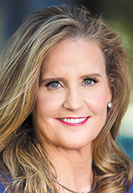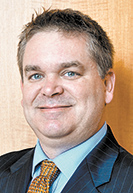Subscriber Benefit
As a subscriber you can listen to articles at work, in the car, or while you work out. Subscribe NowWhile the COVID-19 pandemic canceled scores of previously scheduled events, the Indiana State Bar Association took the opposite approach with its annual meeting.

After a year of national crises, changing practices and court closures, it was “critical” that members of the Indiana bar gather to discuss what’s coming next, outgoing ISBA President Leslie Craig Henderzahs said. So it wasn’t a question of if the annual meeting should go on, it was a question of how to pull it off while keeping members safe.
The answer is a hybrid model that will allow bar members to meet either virtually or in-person. Speakers will still offer CLE, sponsors will still share products and the House of Delegates will still meet. And perhaps most importantly, Henderzahs said, Hoosier lawyers will get the chance to reconnect after months of social distancing.
“The relationships we gain by having meals together we haven’t been able to do,” she said, “but that’s critical to civility.”
The ISBA Annual Meeting Oct. 7-9 will include traditional topics such as lawyer wellbeing and litigation tactics as well as discussions of new trends such as virtual mediations. As with every annual meeting, this year’s event will culminate in a meeting of the House of Delegates, where Henderzahs said discussions will have a wider berth.
The changes seen at this year’s annual meeting are indicative of the changes the ISBA has undertaken as an organization during the pandemic, executive director Joe Skeel said. As the organization looks to life after COVID, some of those changes could be lasting.
Taking care
The in-person portions of this year’s annual meeting will be at the JW Marriott in downtown Indianapolis. Additionally, all CLE presentations will be live-streamed and recorded for later viewing, and speakers will have the option of giving virtual talks.
In-person attendance will be capped at each presentation, according to Ashley Higgins, the bar’s director of meetings and events. The number of available spots will depend on the space available in each room, Higgins said, but she expects CLE attendance to be capped at around 70 people. Each attendee will receive an assigned seat and their own place setting, which will feature a “personal care kit” consisting of items such as a pen and paper and sanitizing wipes.
Additionally, the times of the CLE presentations have been staggered to cut down on close physical contact, Higgins said. There will be two CLE tracks running on Oct. 8 — one related to solo/small firms and the other related to hot topics — and the hot topics track has been intentionally scheduled to conclude 30 minutes after the solo/small firm track.
Similarly, 30-minute program breaks after each session will allow for sanitization and fresh-air breaks for in-person attendees.
The Oct. 9 House of Delegates meeting will be capped at 80 people, Higgins continued. All others will participate via a Zoom livestream, with the chat box open to questions and comments.
Virtual engagement

The annual meeting will also feature the unveiling of the ISBA’s new “engagement hub,” Higgins said.
Describing it as a “Netflix-like” experience, Skeel said the hub will use the On24 platform to allow users to engage with the annual meeting sessions. Like a streaming service, bar members will be able to select which session they want to view from a list of options on a homepage.
Additionally, the hub will host sponsor pages to allow users to engage with vendors in a manner similar to a sponsor hall. These features will be available live or on demand for later engagement, just like a streaming service, Skeel said.
The ISBA was already working toward developing the engagement hub before COVID-19 hit. The bar was interested in finding ways to connect with members outside of the Indianapolis area, so offering virtual engagement was on its radar.
“The pandemic sped up that whole process,” he said.
Looking ahead
The bar, and the legal profession as a whole, has felt the effects of the pandemic far beyond technology. To that end, this year’s House of Delegates meeting will take on a new form.
In addition to discussing the business of the ISBA, delegates will spend time discussing how the pandemic has affected the legal profession, Henderzahs said. For example, how will remote work be used in the future? How can the courts adapt to virtual options?
Beyond COVID, the House of Delegates will also take a broader look at the future of the legal profession generally, she said. That will include status reports from the Indiana Supreme Court, Court of Appeals and attorney general.
Issues of due process should also be discussed, Henderzahs added, especially in an era when big businesses feel that lawyers take too long to resolve disputes.
In general, the outgoing president said there’s been a mindset shift in the bar away from looking back to instead looking ahead.
“When I was in law school, it was all from a historical perspective, looking at how old laws apply now,” she said. “But now we’re looking toward the future.”
Coming changes?
The ISBA itself is looking to the future, Skeel said. One of his next endeavors will be to convene a task force to decide what comes next for the organization.
For example, the pandemic has begged a question: does the ISBA need a home base, or will virtual work continue to work? Productivity at the organization has not waned because of the pandemic, Skeel said, and younger employees prefer the flexibility of remote work options.
What’s more, the ISBA’s lease on its downtown Indianapolis office will be up in February 2021, Skeel said. His recommendation will likely be that ISBA staffers come into the office one or two days a week to maintain camaraderie, then work remotely the rest of the time.
Members will have a say in the future of the ISBA, Skeel noted. A member survey sent out just as the pandemic hit yielded a 10% response rate and showed some gains for the organization.
For example, the percentage of members who are “highly engaged” with the bar has increased since Skeel became executive director in 2018, he said. Among those members, there was a high value placed on the bar’s sections and legislative advocacy work.
Though the survey was sent out during the pandemic, its results are not COVID-specific. Once the bar organizes those results, it will use the data during its strategic planning process this fall, Skeel said.•
Please enable JavaScript to view this content.
